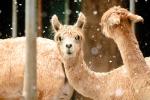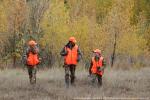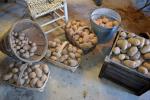March 2015
If you have ever wanted to hunt quail, grouse, deer, wild boar or even black bear, find your way to the mountains of eastern Tennessee. If you’re an experienced hunter looking for new challenges, Appalachia Adventures is for you.
Farmers going back to the future for natural planting techniques.
Some Seedy History
Agriculture in the early American reaches of Appalachia kept families alive. They grew what they could, hunted when they could and gathered whatever they could find. No matter what they planted — tomatoes, corn, beans or beets — they always saved some seeds for replanting the following year. It was the only way to maintain a crop year after year.
“Arsh potatoes” is what you might hear an old-timer in the Appalachians refer to when talking about Irish, or white, potatoes. Arsh potatoes are different from sweet potatoes, which also are quite fondly eaten in the Southern Appalachian Mountains.
Roots of Ancestry
Copper River Grill is fast becoming a staple on the
restaurant scene running all over the mountains of
northwestern South Carolina. Founded in 2005 in
Seneca, SC, the eatery pegs itself as the “Last
Frontier.” They use only super
 high-quality ingredients and provide a causal
atmosphere and a menu with pretty reasonable prices.
high-quality ingredients and provide a causal
atmosphere and a menu with pretty reasonable prices.
Easter activities are beginning to show up on area calendars as the snow in the higher elevations melts and the spring clothes come out of the attic. Easter is a special time of year for Christians who honor the resurrection of Jesus as a signal of new life.
Americans of all religious leanings enjoy the holiday as a sign of new growth, budding opportunities and renewal. Children like Easter for the mythical bunny who brings them baskets of chocolate and painted Easter eggs. In the Easter tradition, adults hide colored eggs for children to hunt down.
Whether you plant them yourself or not, the wildflowers of the Appalachians give visitors and natives alike a glorious beckoning of warmer, brighter days to come. Enjoy viewing these buds as they bloom around the mountains in the earliest parts of spring:
Bloodroot
Attain the Perfect Yard with Naturescapes
A new way to look at an old problem.









a005.jpg?itok=qGObosRB)
